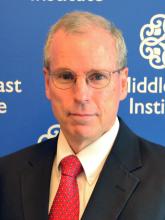This week's briefing on recent news and upcoming events in the region featuring Marvin G. Weinbaum, Hafsa Halawa, Robert S. Ford, and Thomas W. Lippman.
Will Afghanistan have a Christmas surprise?
Marvin G. Weinbaum
Director for Afghanistan and Pakistan Studies

In the twilight months of his presidency, President Donald Trump appears to be doubling down on his long-promised troop withdrawals from Afghanistan, conceivably even trying to make good on his tweeted wish to have American forces exit by Christmas. His recent firing of Defense Secretary Mark Esper and other administration officials seems to signal a willingness to proceed with a full military disengagement regardless of conditions on the ground or lack of progress on a peace deal with the Taliban. Like much of the U.S. military, the Pentagon officials who have been removed are believed to have favored retaining a residual counterterrorism force through April — as specified in last February’s agreement with the Taliban — and beyond if necessary. U.S. military planners have been willing to accept a force reduction in Afghanistan down to roughly 4,500 troops, the minimum number generally thought necessary to address the terrorist threat posed by al-Qaeda and Islamic State-Khorasan Province. Esper’s replacement, Christopher Miller, has expressed his acceptance of President Trump’s desire to bring home as quickly as possible, not only those remaining troops in Afghanistan but also throughout the Middle East. But because of the physical difficulties in moving personnel and valuable equipment, a short-term full exit from Afghanistan seems unrealistic. The best indications are that around 2,500 U.S. troops will still be in the country by year’s end.
The implications of a premature Trump-dictated withdrawal of forces are likely profound. What little leverage the Kabul government brought into the ongoing intra-Afghan negotiations diminished further with Washington’s announced unilateral force reductions. The extraction of American troops and with them multinational forces has always been the reason for the Taliban’s willingness to engage with American officials. For the Taliban, February’s deal with the U.S., which set the stage for intra-Afghan talks, was not so much about negotiating a peace settlement as ensuring that the U.S.’s commitment to pull out remained on track. Despite the Kabul government’s brave face, the possibly imminent loss of American military trainers and advisors, and above all U.S. airpower, will seriously test its ability to cope with an insurgency gathering momentum. Fear of abandonment by the U.S. may exact as much of a blow to ordinary Afghans’ confidence in the future as it does to the country’s security forces.
An accelerated departure of U.S. troops may also have a direct bearing on policy options open to an incoming Biden administration. Trump’s actions can preempt a new U.S. government’s ability to set the pace of disengagement and leave less opportunity for devising a revised approach to the stalled Doha negotiations. The Biden team’s reported consideration of plans to keep on a few thousand special forces units for counterterrorism could be complicated. While Trump and Joe Biden share a determination to have an early end to America’s longest-running conflict, their timetables stand apart.
This article was co-authored by Hamid Safi, Ghasharib Shoukat, and Jack Stewart, research assistants to Marvin G. Weinbaum.
@mgweinbaum
Iraq intensifies IDP camp closures, putting hundreds of thousands at risk
Hafsa Halawa
Non-resident Scholar

In the last month, Iraq’s government has revisited its desire to reduce the number of internally displaced persons (IDPs) in the country by pursuing an intense campaign of forced IDP camp closures. AFP reports that since Oct. 18, up to seven camps have been closed or ordered to close in the coming weeks. The Norwegian Refugee Council has warned that this exercise could leave at least 100,000 people at risk as camp closures continue. As of the end of October 2020, Iraq had just under 1.3 million official IDPs still in the country.
That number has significantly decreased since 2014 and the height of the war against ISIS that forcibly displaced over 6 million Iraqis, but evidence suggests that a structured and robust system of return for displaced Iraqis is at best lacking, or at worst simply non-existent.
Research conducted throughout 2018/19 showed that the process to reduce the official number of IDPs — aiming to reflect a positive improvement on the Iraqi government’s ability to reduce the number of IDP camps — lacks a structured promotion of return to areas of origin. This is primarily owing to the lack of reconstruction and rehabilitation of areas decimated by the conflict, but it is also due to non-existent reconciliation plans that have left many IDPs, primarily those accused or alleged to have been related to ISIS fighters or supportive of ISIS, vulnerable and insecure, should they return to their homes.
While a great number have indeed returned to their areas of origin, for many their homes simply no longer exist. For others, the threat of violence or ostracization from communities is so high that they refuse to return, taking it upon themselves to re-displace to new cities outside of the formal system that supports the IDP camp infrastructure. By extension, this leaves them economically, physically, and mentally insecure, and lacking opportunities to seek employment, cover basic expenditure, and protect themselves and their families from forms of retribution in new areas. It can also leave them unable to access state services or government institutions owing to the lack of a paper trail or registration in different cities. They simply disappear, absorbed as nameless persons in new cities.
Meanwhile, in the last week hundreds of Yezidi IDPs gathered at a camp in Duhok Province to protest the presence of the Kurdistan Workers’ Party (PKK) in Sinjar, while also expressing their willingness to return to their homes if the PKK and other illegal forces leave the region. This was part of wider protests at other camps in Sinjar, where people called on the Iraqi and Kurdish governments to implement the Erbil-Baghdad agreement (as recently agreed between the federal and regional governments) on security and governance of the area.
All of this comes amid an economic crisis that has been compounded by continued political stalemate, bringing the country to the brink of disaster. An assessment by the Iraqi Ministry of Planning with the support of UNICEF, the World Bank, and the Oxford Poverty and Human Development Initiative found that “an additional 4.5 million (11.7%) of Iraqis risk falling below the poverty line as a result of the socio-economic impact of COVID-19.”
Successive governments’ attempts to make the IDP situation go away have resulted in a complete abdication of responsibility and duty toward the citizens they purport to serve, leading to the cyclical displacement of vulnerable persons. Iraq needs a robust and structured approach to camp closures, which must be supported by rapid reconstruction efforts to rebuild and rehabilitate infrastructure in the liberated areas, as well as a succinct social cohesion plan that can tackle the enlarged trust deficits that exist within war-torn communities. In the absence of that, the country’s own government is only putting more citizens in harm’s way and creating an enduring and protracted crisis that will define Iraq in the years, and possibly decades, to come.
Western Sahara: An unusual flare up
Robert S. Ford
Senior Fellow

Clashes between Morocco and the Polisario in the normally quiet Western Sahara so far remain limited and small scale. Fighting started after the Moroccan army last Friday entered a narrow, demilitarized strip at the Guerguerat border crossing between Morocco and Mauritania to remove several dozen Sahrawi protesters who had been blocking commercial truck traffic for weeks. The U.N. and European Union over the weekend publicly urged Morocco and the Polisario to respect the 1991 cease-fire and not to obstruct commercial road traffic.
The Polisario leadership on Friday and Saturday publicly stated that after the Moroccan incursion at Guerguerat the cease-fire is over. Moroccan and Polisario media sources claimed Polisario fighters launched a few raids on Moroccan positions along the 1,700-mile berm wall Morocco has built to reinforce its control over 80 percent of the Western Sahara territory. The Polisario defense minister said on Saturday that young Sahrawis are frustrated at the political stalemate.
U.N.-sponsored talks between Morocco and the Polisario have been moribund since the last U.N. special envoy for the Western Sahara quit in May 2019; no replacement has been named. On Oct. 30 the U.N. Security Council had renewed the mandate for the U.N. peacekeeping mission in the Western Sahara for one year and urged the U.N. to restart political settlement talks in Geneva that had involved Morocco, the Polisario, Algeria, and Mauritania. However, Morocco’s foreign minister last month reiterated that his government would not negotiate with the Polisario, calling it a “gang.”
Morocco is steadily gaining international support for its claim of sovereignty over the territory with African nations and the United Arab Emirates recently announcing the opening of consulates there. Still, the Polisario won’t escalate sharply. Its military capabilities are limited, and Algeria, the Polisario’s key backer, deplored the Moroccan incursion at Guerguerat last Saturday while also urging both sides to act with restraint and respect the cease-fire in order to avoid endangering regional stability.
@fordrs58
Saudi Arabia prepares for a scaled back, virtual G20 summit
Thomas W. Lippman
MEI Scholar

This year’s summit meeting of leaders of the world’s 20 most important economic powers, to be held in Riyadh, Saudi Arabia this weekend, was to be a showcase of achievement, pride, and validation for the kingdom. It isn’t shaping up that way.
In normal times, the annual G20 summit is an extravaganza at which world leaders present themselves as forward thinkers and do-gooders, posing for a thousand cameras in a show of goodwill and good intentions. These, of course, are not normal times: because of the COVID-19 pandemic, the summit will be virtual, depriving the Saudis of an opportunity to put on the sort of over-the-top event they staged when President Donald Trump visited in 2017.
Now Trump is nearing the end of his presidency and has other things on his mind. An internet search for “G20 summit Riyadh” on the White House website on Saturday produced no results. Trump’s departure will deprive Saudi Crown Prince Mohammed bin Salman (MbS), the country’s de facto ruler, of his most reliable patron and supporter.
For MbS, it is probably just as well that some of the national leaders who would have been expected to attend will not travel to Riyadh, because they are out of favor with him — as he is with some of them.
Turkish President Recep Tayyip Erdogan, for example, has provided most of the evidence establishing MbS’s responsibility for the savage 2018 murder of the dissident Saudi journalist Jamal Khashoggi, who was killed by Saudi agents inside the Saudi consulate in Istanbul.
Russian President Vladimir Putin has given crucial support to Syria’s Bashar al-Assad, an ally of Saudi Arabia’s archrival Iran. The Saudis have tried for years to engineer Assad’s ouster.
And French President Emmanuel Macron is out of favor in much of the Muslim world because of his crackdown on Islamist violence after the murder of a schoolteacher in a mostly-Muslim Paris suburb.
The usual G20 summit photo of all the leaders smiling with the host would hardly have been credible, but because the meeting is virtual they will not have to pretend.
Photo by Wali Sabawoon/NurPhoto via Getty Images
The Middle East Institute (MEI) is an independent, non-partisan, non-for-profit, educational organization. It does not engage in advocacy and its scholars’ opinions are their own. MEI welcomes financial donations, but retains sole editorial control over its work and its publications reflect only the authors’ views. For a listing of MEI donors, please click here.













